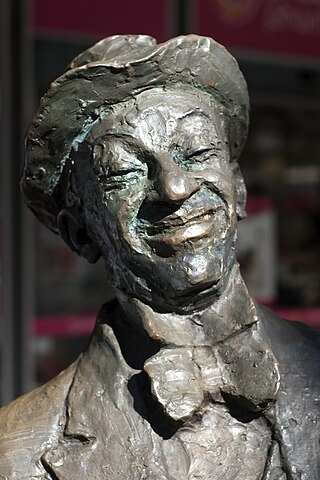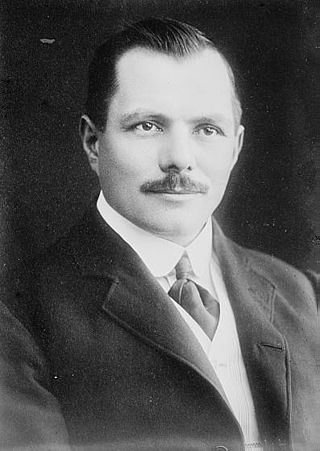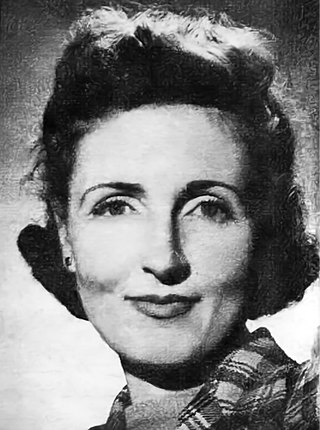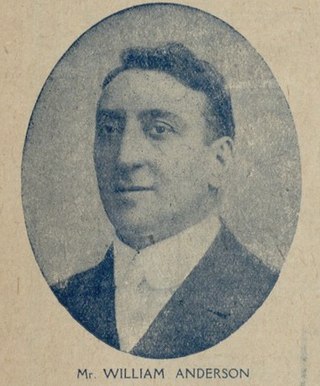Related Research Articles

Roy Rene was an Australian comedian and vaudevillian. As the bawdy character Mo McCackie, Rene was one of the most well-known and successful Australian comedians of the early 20th century, and the local answer to Charlie Chaplin.

Louise Lovely was an Australian film actress of Swiss-Italian descent. She is credited by film historians as being the first Australian actress to have a successful career in Hollywood, signing a contract with Universal Pictures in the United States in 1914. Lovely appeared in 50 American films and ten Australian films before retiring from acting in 1925.

Thelma Marjorie Scott was an Australian character actress whose six-decade career in theatre, radio, film and Australian made her one of her country's most recognisable and beloved personalities. Having started her career in the early 1930s in theatre and film productions, she became one of the nation's biggest radio performers, during the 1940s featuring in productions such as Big Sister and Blue Hills. She returned to make TV films in the early late 1950s and then became a star on television after it was launched in Australia. She became best known for roles in soap operas including Number 96 as Claire Houghton and Mrs. Jennings in Richmond Hill.

George Marlow was an Australian theatrical entrepreneur born in London of Jewish extraction, noted for bringing melodrama and pantomime to Sydney audiences in the early 1900s. His name has been frequently mis-spelled as "George Marlowe".

Hugh Donald "Huge Deal" McIntosh was an Australian theatrical entrepreneur, sporting promoter and newspaper proprietor

Hugh Chilman Buckler was a British actor. He was married to stage actress Violet Paget, about whom little has been found, save that she was somehow related to the Marquess of Anglesey. The film actor John Buckler was their son.
William Mower Akhurst was an actor, journalist and playwright in Australia.

Thelma May Afford was an Australian costume designer, theatre performer, and fashion journalist who worked in Adelaide, Melbourne, and Sydney.

Annie Vera Pearce was an Australian stage and film actress. Her lengthy career was carried out in both her home country and in England.
Frank Beaumont "Beau" Smith, was an Australian film director, producer and exhibitor, best known for making low-budget comedies.

The Martyrdom of Nurse Cavell is a 1916 Australian silent film starring John Gavin about the execution of nurse Edith Cavell during World War I.

Our Friends, the Hayseeds is a 1917 Australian rural comedy from director Beaumont Smith. It centers on the rural family, the Hayseeds, and their rivalry with a neighbouring family, the Duggans.

Alfred Rolfe, real name Alfred Roker, was an Australian stage and film director and actor, best known for being the son-in-law of the celebrated actor-manager Alfred Dampier, with whom he appeared frequently on stage, and for his prolific output as a director during Australia's silent era, including Captain Midnight, the Bush King (1911), Captain Starlight, or Gentleman of the Road (1911) and The Hero of the Dardanelles (1915). Only one of his films as director survives today.

William Anderson was an Australian theatre entrepreneur.
White's Rooms, later known as Adelaide Assembly Room, was a privately owned function centre which opened in 1856 on King William Street, Adelaide, South Australia. It became Garner's Theatre in 1880, then passed through several hands, being known as the Tivoli theatre, Bijou Theatre, Star Picture Theatre and finally in 1916 the Majestic Theatre and Majestic Hotel.

Henry Eli White, also known as Harry White, was a New Zealand-born architect best known for the many theatres and cinemas he designed in New Zealand and Australia in the 1910s and 1920s. Many of the major surviving historic venues in the two countries are White designs, including the St. James Theatre, Wellington, St. James Theatre, Auckland, the Capitol Theatre and State Theatre in Sydney, and the Palais Theatre and the interiors of the Princess Theatre and Athenaeum Theatre in Melbourne. He also designed the City Hall and the attached Civic Theatre in Newcastle, New South Wales.
Frederick Ward was an English-born actor and theatre manager in Australia. He founded Sydney's first repertory theatre.
Wilton Welch was an Australian comic actor and dramatist, husband and collaborator of Louise Carbasse, best known as Louise Lovely.
Frank William Greene was an English baritone singer and comedian in Australia from 1909–20, when he left for America.
Jack Haskell was an American theatrical producer who specialised in revue, later a dance director in Hollywood. Much of his early work was for J. C. Williamson's (JCW) in Australia.
References
- ↑ "Gossip of the Theatres and Pictures". The Referee . No. 1464. New South Wales, Australia. 18 November 1914. p. 15. Retrieved 7 June 2022– via National Library of Australia.
- ↑ "Tivoli Theatre". The Daily Telegraph. No. 11070. New South Wales, Australia. 14 November 1914. p. 14. Retrieved 26 June 2022– via National Library of Australia.
- ↑ "Advertising". The Journal (Adelaide) . Vol. LII, no. 14243. South Australia. 12 February 1917. p. 3. Retrieved 11 June 2022– via National Library of Australia.
- ↑ "The Tivoli Follies". The Age . No. 23, 530. Victoria, Australia. 8 September 1930. p. 13. Retrieved 11 June 2022– via National Library of Australia.
- ↑ "Tivoli "Follies"". The Argus (Melbourne) . No. 26, 242. Victoria, Australia. 22 September 1930. p. 12. Retrieved 11 June 2022– via National Library of Australia.
- ↑ "Amusements". The Maitland Daily Mercury . No. 19, 156. New South Wales, Australia. 31 August 1932. p. 6. Retrieved 11 June 2022– via National Library of Australia.
- ↑ "Tivoli Follies open on Saturday". The Barrier Miner . Vol. XLIX, no. 14, 713. New South Wales, Australia. 1 October 1936. p. 6. Retrieved 11 June 2022– via National Library of Australia.